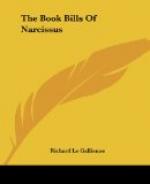’He swept a fine majestic sweep
Of toga Tennysonian,
Wore strange soft hat, that such as you
Would tremble to be known
in,’
nevertheless, he somehow won happier fates, on which, perhaps, it would be unbecoming in so close a friend to dilate.
The ‘true’ poet is, first of all, a gentleman, usually modest, never arrogant, and only assertive when pushed. He does not by instinct take himself seriously, as the ‘poet-ape’ doth, though if he meets with recognition it becomes, of course, his duty to acknowledge his faculty, and make good Scriptural use of it.
He is probably least confident, however, when praised; and never, except in rare moments, especially of eclipse, has he a strong faith in the truth that is in him. Therefore crush him, saith the Philistine, as we crush the vine; strike him, as one strikes the lyre. When young, he imagines the world to be filled with one ambition; later on, he finds that so indeed it is—but the name thereof is not Poesy. Strange! sighs he. And if, when he is seventeen, he writes a fluent song, and his fellow-clerk admire it, why, it is nothing; surely the ledger-man hath such scraps in his poke, or at least can roll off better. ’True bards believe all able to achieve what they achieve,’ said Naddo. But lo! that ambition is a word that begins with pounds and ends with pence—like life, quoth the ledger-man, who, after all, had but card-scores, a tailor’s account, and the bill for his wife’s confinement in his pocket.
All through his life he loves his last-written most, and no honey of Hybla is so sweet as a new rhyme. Let no maid hope to rival it with her lips—she but interrupts: for the travail of a poet is even as that of his wife—after the pain comes that dear joy of a new thing born into the world, which doting sipping dream beware to break. Fifty repetitions of the new sweetness, fifty deliberate rollings of it under the tongue, is, I understand, the minimum duration of such, before the passion is worked off, and the dream-child really breathing free of its dream-parent. I have occasionally come upon Narcissus about the twenty-fifth, I suppose, and wondered at my glum reception. ’Poetry gone sour,’ he once gave as the reason. Try it not, Reader, if, indeed, in thy colony of beavers a poet really dwells.




